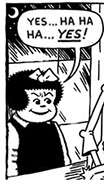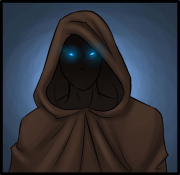|
Kemper Boyd posted:This is very much true. A good example of how bad he was putting at stuff into writing is how the wizards ended up being in 3rd edition, because it's pretty obvious that the 3rd ed designers missed the purpose behind all the fiddly limitations put on wizards. It showed a really stark difference in playtesting. Gygax playtested with, well, mostly current or former wargamers. They did everything they could to break the poo poo out of the game. They were in a way early min/maxers. They weren't there for the "roleplaying." It's why AD&D has so many bizarre and stupid "lmao gently caress you" monsters, because they were part of what ended up being an arms race between him and the players. You keep stopping at doors to listen in? gently caress you, there's a monster that burrows in your ear to kill you! One side effect of this is that, well, it meant the players on the mechanics side never got all that strong. Wizards had a fuckton of fiddly limitations because the players found ways to work around them or beat them or otherwise excelled in spite of that. Thief skills sucked because the players were already going over how they opened chests and investigated rooms in minute details. Fighters lacked skills because the players supplemented that with their own descriptions of how they did poo poo. And none of that got carried over. The 3e playtesting was done by former AD&D developers DMing the game for other former AD&D players. Everyone knew their "roles" already. The clerics healed, the wizards fireballed. None of them were really used to rigorous play, so wizard fiddliness was removed, because they never learned to work around it, which made wizards way more powerful. Fighters didn't get skills because they never had skills, except now there's an actual skill system, so the previous rule of "just act it out" doesn't fly anymore. They at no point actually stress tested the system, and kept large amounts of cruft because "well it's probably there for a reason." This went on to pretty much be 3e's legacy. Fans defended it with "it's ROLEPLAYING, not ROLLPLAYING," which misses the point so entirely that their statements ends up on that one planet that's directly opposite the sun from Earth. If there's anything I hate 3e for, it's more or less championing and popularizing the idea that imbalance was ok because the DM will naturally learn to fix things. That's not to say that idea wasn't always around, but I think 3e is the one that made it the cornerstone of game development. Gygax hated imbalances, and while that's not to say he got it right, he at least tried. Anyways my point is gently caress 3e, it's basically the milestone that continues to hang around the hobby's neck and keeps it drowning. It was the laziest edition of 3e before 5e came around, it encouraged the antithesis of creativity, and it's legacy of doing things half-rear end and not paying attention and forcing more work on the actual players continues to this day.
|
|
|
|

|
| # ? May 9, 2024 08:59 |
|
ProfessorCirno posted:They at no point actually stress tested the system, and kept large amounts of cruft because "well it's probably there for a reason." This went on to pretty much be 3e's legacy. Fans defended it with "it's ROLEPLAYING, not ROLLPLAYING," which misses the point so entirely that their statements ends up on that one planet that's directly opposite the sun from Earth. 
|
|
|
|
ProfessorCirno posted:It showed a really stark difference in playtesting. It's worth noting that much of the "adversarial DMing" style so hated today stems directly from Gygax's table, too, with incidents like "this dude is dual-wielding vorpal swords and that's too powerful so gently caress you, drain the magic from them" and "gently caress you, Robilar, for beating the Temple of Elemental Evil, an army comes after you and razes your army to the ground." The character of Robilar is especially egregious in that the player got tired of the pace of play in the 12-20 person sessions Gygax had going and would frequently come over every day for solo adventures, meaning he had vastly more XP than anyone else in Gygax's group. All that said, my favorite anecdote from Early Gygax Games was the player of Rary deciding to retire the character at 3rd level, when his rank was that of Medium, because he had achieved his stated goal of being able to refer to the character as Medium Rary.
|
|
|
|
ProfessorCirno posted:Fighters didn't get skills because they never had skills, except now there's an actual skill system, so the previous rule of "just act it out" doesn't fly anymore. Yet another misstep I've observed from the "Rolemaster vs 3rd Edition" relationship is that they missed translating the skill correctly. In Rolemaster, your maximum ranks in a skill are capped by your character level, same as in 3rd Edition. In Rolemaster, the cost of increasing your rank in a skill varies depending on your class. 3rd Edition emulates this in somewhat coarsely: if it's a class skill, it costs 1 skill point to get a rank. If it's not, it costs 2 points to get a rank, and different classes have different sets of class skills. But that's where Rolemaster stops. In 3rd Edition, you also have classes gaining skill points at different rates. It's not enough that the Fighter doesn't have as many class skills as the Rogue, the Fighter also doesn't gain as many points as the Rogue to begin with. Now, in a way, this is made up for by the fact that in Rolemaster, your "Base Attack Bonus" is effectively something that you still need to spend skill points on, whereas it's given "for free" for the D&D 3e Fighter, but the end result still has the Fighter lagging way the hell behind in useful non-combat tasks from the double-whammy when simply giving them fewer class skills to work with but with the "standard" 4 or 6 skill points per level may have worked just as well. EDIT: The RM Fighter would in this analogy have to spend their skill points on "Armor Mastery" on top of improving their BAB, to reduce the hefty Armor Check Penalties, but again the analogy falls apart because the D&D Fighter doesn't even get to do that, so they're saddled with the -6 or whatever to Climb and Jump and Swim for wearing plate, even when Climb and Jump and Swim are the few actual class skills they do have. gradenko_2000 fucked around with this message at 15:58 on Jul 17, 2016 |
|
|
|
ProfessorCirno posted:Anyways my point is gently caress 3e, it's basically the milestone that continues to hang around the hobby's neck and keeps it drowning. It was the laziest edition of 3e before 5e came around, it encouraged the antithesis of creativity, and it's legacy of doing things half-rear end and not paying attention and forcing more work on the actual players continues to this day. 3e is weird because the designers obviously wanted to improve it, but improvements were often met with heaps of vitrol from certain wings of the playerbase. The Tome of Battle was an excellent hard-reboot of the fighter, paladin, and rogue/monk. the designers clearly figured out that part of the problem with the early spellcasters was how wide the scope of their powers were, and the later casters were all far more limited in their spell pool: the beguiler, the dread necromancer, and the warmage. They were decently well-received, except for the people who snorted and pointed out that a wizard could already do everything they did better. Psionics offered a great alternative casting system, but lots of people rejected it. Either because of some bitter legacy-hate of psionics or because they hated that it came with unique setting flavors like ~psychic crystals~. Even the Tome of Magic casters were a good idea in theory, but the book fell flat because nobody playtested the shadowcaster or truenamer. This was all capped off by taking years of player and designer feedback and applying it to 4e, and we all know how that turned out. So the platonic ideal of 3e is how it was when you were young and innocent at 12, and the 3.5 PHB just came out, and your group doesn't know what CoDzilla is. not 3 years later when Joe has been using the tips on playing wizards he googled from a charop board to lead a war of escalation with the DM, and this weird new ANIME SWORD FIGHTING book was released and omg this is not like my delicate tween years anymore. Nuns with Guns fucked around with this message at 16:06 on Jul 17, 2016 |
|
|
|
Nuns with Guns posted:3e is weird because the designers obviously wanted to improve it, but improvements were often met with heaps of vitrol from certain wings of the playerbase.
|
|
|
|
DivineCoffeeBinge posted:The character of Robilar is especially egregious in that the player got tired of the pace of play in the 12-20 person sessions Gygax had going and would frequently come over every day for solo adventures, meaning he had vastly more XP than anyone else in Gygax's group.
|
|
|
|
Dr. Quarex posted:I enjoy thinking of early Dungeons & Dragons as a thing that the gamemasters were powerless to stop, so every time someone showed up and wanted to play Gary Gygax had no choice but to start running a game even if he were in the middle of dinner or about to leave on vacation. One reason I tend to cast shade on OSR in general is way too little of it is interested in the weird ideas from the early days. Early D&D had a ton of assumptions about how gaming worked that are alien to modern players. Exploring those things in a systematic way could yield some really cool ideas. But there seems to be so little work done in that vein. It's not just the weird subsystems that weren't necessarily busted but were dropped in the name of cohesion - which was a reasonable choice. It's readily apparent that early on, no one had the concept that each DM would be running their own campaign. In fact, the default assumption was that a player would bring the same character to every game, regardless of who was DMing, and the other DMs would just go along with whatever weird poo poo that character picked up between sessions. That's the source of why people hate overly generous (Monty Haul) DMs so much, in fact. It makes zero sense that people bitch and cry about it these days, when every game is separate. As long as it hasn't made things unfun for that group in their campaign, why should anyone give a poo poo if they've all got bags full of vorpal holy swords or whatever? But back in the early days it really was an issue, because if Anne and Bob played with Cindy and Doug, and Cindy handed out powerful items like candy, it could totally gently caress up Doug's game (with Elisa and Frank, who didn't play in Cindy's game) since half his players have way better stuff than the other. So what another DM did actually had a direct effect on your own game. There are shared world games out there - the Living campaigns - but things like assuming crossover PCs, rotating DM duties, and so forth were really baseline assumptions for early D&D, and it'd be cool to see a newer game try to intentionally leverage stuff like that.
|
|
|
|
Comrade Gorbash posted:Based on the stories about that period, this might actually be true.
|
|
|
|
Nuns with Guns posted:3e is weird because the designers obviously wanted to improve it, but improvements were often met with heaps of vitrol from certain wings of the playerbase. The Tome of Battle was an excellent hard-reboot of the fighter, paladin, and rogue/monk. the designers clearly figured out that part of the problem with the early spellcasters was how wide the scope of their powers were, and the later casters were all far more limited in their spell pool: the beguiler, the dread necromancer, and the warmage. They were decently well-received, except for the people who snorted and pointed out that a wizard could already do everything they did better. Psionics offered a great alternative casting system, but lots of people rejected it. Either because of some bitter legacy-hate of psionics or because they hated that it came with unique setting flavors like ~psychic crystals~. Even the Tome of Magic casters were a good idea in theory, but the book fell flat because nobody playtested the shadowcaster or truenamer. This was all capped off by taking years of player and designer feedback and applying it to 4e, and we all know how that turned out.
|
|
|
|
Comrade Gorbash posted:Based on the stories about that period, this might actually be true. In my original gaming group (University of Wisconsin- Madison's DMA back in the 70s- 80s), 'open world' was completely a thing and you would get bizarre collections of classes, characters, and items and somehow as a DM had to make it work. It was probably that which is why I have no problem with house rules beingan essential part of the game.
|
|
|
|
I just want to say I'm sorry for kicking this off by supposing that Gygax held commonplace prejudices rather than being a weirdly backwards pseudointellectual bigot like Lovecraft. I also am not going to defend that supposition because I don't like Gygax enough personally to even bother. Although I am interested in all the conflicting gaming advice he gave over the years and what it had to do with how it worked at his own gaming table.Ewen Cluney posted:I'm increasingly of the opinion that while Gygax was a better game designer than people sometimes give him credit for, he was a much worse writer than his fans would have us believe. A lot of things in D&D had a lot of thought and testing go into them, yet he couldn't be bothered to put into words how and why they worked (despite being a prolific writer across zines and such), so that the people who took over D&D wound up making new editions based on their own cargo cult understanding of the game rather than the game he intended but failed to actually communicate in writing. ProfessorCirno posted:It showed a really stark difference in playtesting. quote:Anyways my point is gently caress 3e, it's basically the milestone that continues to hang around the hobby's neck and keeps it drowning. It was the laziest edition of 3e before 5e came around, it encouraged the antithesis of creativity, and it's legacy of doing things half-rear end and not paying attention and forcing more work on the actual players continues to this day.
|
|
|
|
Nuns with Guns posted:So the platonic ideal of 3e is how it was when you were young and innocent at 12, and the 3.5 PHB just came out, and your group doesn't know what CoDzilla is. not 3 years later when Joe has been using the tips on playing wizards he googled from a charop board to lead a war of escalation with the DM, and this weird new ANIME SWORD FIGHTING book was released and omg this is not like my delicate tween years anymore. Watching anime during my pre-teen years helped inculcate me against this kind of thinking. Thanks anime!
|
|
|
|
I think Gygax definitely had ideas worth examining, but I don't think we can measure his work based on some imagined platonic ideal where he wrote with perfect clarity. Indeed, there has been a lot of straightforward work done on clarifying the existing text of AD&D and it's not just a mess, but a gordian knot left for future writers of D&D to try and unwind to varying levels of effectiveness. That isn't to say there aren't innovative ideas and that it isn't groundbreaking as a whole, but a lot of those ideas would be in terrible need of refinement. While it's unrealistic to expect any designer to have something like D&D strike twice, the fact that Gygax couldn't really replicate any of his success says a lot to me. A lot of D&D's creation came out of organic circumstances that couldn't be replicated. Gygax was one important element in all of that, but the fact that his rules saw such frequent mutation wasn't just a fault of the writing, but the fault that a decent chunk of the rules are just unwieldy or just plan unfun, like armor class by weapon or racial level limits.
|
|
|
|
Alien Rope Burn posted:I think Gygax definitely had ideas worth examining, but I don't think we can measure his work based on some imagined platonic ideal where he wrote with perfect clarity. Indeed, there has been a lot of straightforward work done on clarifying the existing text of AD&D and it's not just a mess, but a gordian knot left for future writers of D&D to try and unwind to varying levels of effectiveness. That isn't to say there aren't innovative ideas and that it isn't groundbreaking as a whole, but a lot of those ideas would be in terrible need of refinement. I think that a big deal is that it was fairly late that designers actually started examining how their games were played: everyone keeps talking about how in The Days Of Yore a character could die in seconds, but it's fairly clear that a lot of people ran D&D and AD&D in ways where totally random death didn't happen. My guess is that even Gygax did it at times and specific situations. I am reminded of the whole Spaghetti Sauce TED talk thing (the one with Malcolm Gladwell) whenever I see a lot of people posting about how they want gritty low-magic realistic fantasy and really, no one really plays a game like that anywhere.
|
|
|
|
Halloween Jack posted:I just want to say I'm sorry for kicking this off by supposing that Gygax held commonplace prejudices rather than being a weirdly backwards pseudointellectual bigot like Lovecraft. I also am not going to defend that supposition because I don't like Gygax enough personally to even bother. Although I am interested in all the conflicting gaming advice he gave over the years and what it had to do with how it worked at his own gaming table. I think we would find that Gygax actually played things really fast and loose in his own table, and the massive overcodification of rules in AD&D was more him making rules because he felt he had to (in order to have a solid baseline for tournament play), rather than something that he himself wanted to practice.
|
|
|
|
Kemper Boyd posted:I think that a big deal is that it was fairly late that designers actually started examining how their games were played: everyone keeps talking about how in The Days Of Yore a character could die in seconds, but it's fairly clear that a lot of people ran D&D and AD&D in ways where totally random death didn't happen. My guess is that even Gygax did it at times and specific situations. So many people read the Gygax rulebooks (with their endless stern essays about making players earn their progress and not being overly generous) and looked at the published example modules (many of which were adversarial high-lethality deathtraps) and not-unreasonably concluded that this was the way that the game was meant to be played.
|
|
|
|
Kemper Boyd posted:I think that a big deal is that it was fairly late that designers actually started examining how their games were played: everyone keeps talking about how in The Days Of Yore a character could die in seconds, but it's fairly clear that a lot of people ran D&D and AD&D in ways where totally random death didn't happen. My guess is that even Gygax did it at times and specific situations. Frankly, I don't think D&D was very honest in its advertising. Those comic book ads emphasized spells, thief skills, and magic swords, but not mapping or timekeeping, let alone marching order, the caller, keeping track of logistical details like torches and rations, or fiddly rules from AD&D like weapon speed and combat segments. So you have an audience entering the game expecting to play, well, the characters from the books in Appendix N, only to be greeted by a fortress of gatekeeping, both in the text and in the existing fanbase, telling them to be serious and detail-obsessed and earn their fun. It's not just that your PC is less powerful than Corwin and Elric, you're also expected to keep track of a lot of detail that doesn't make for a good pulp fantasy narrative. Hence a toxic dynamic that still exists today. Edit: That's without getting into what sounds like a frankly terrible attitude among some of the early module designers, who were aghast that anyone would actually want to buy adventures and settings instead of making their own, but were happy to take their money, looking down on their customers all the while. Halloween Jack fucked around with this message at 14:49 on Jul 18, 2016 |
|
|
|
Halloween Jack posted:
Everybody I knew (and everybody they knew, even apart from the ones I knew) played B/X and AD&D as advertised, rather than RAW. Something else happened between 1e and 3e to create the toxicity.
|
|
|
|
It's one of those things that you wish you had modern video recording for, because a lot of what I've heard described makes it sound like D&D was a hell of a lot more "boardgamey" than most people'd be willing to admit*. If I'm not mistaken, part of D&D was borne out of trying to make a "zoomed-in tactical module" for when Gygax's games of Chainmail started getting down to people infiltrating a castle from underneath. * and on a personal level I kind of like that aspect of it. I don't go full grog, but I do like the whole atmosphere of trying to discern what's down each corridor before going down it, planning for dynamic entries, listening and peeking through doors, trying to prevent reinforcements from coming in because monsters are expected to behave intelligently, capturing mooks to get "battlefield intel", and generally just dungeoneering in a methodical manner.
|
|
|
|
homullus posted:Everybody I knew (and everybody they knew, even apart from the ones I knew) played B/X and AD&D as advertised, rather than RAW. Something else happened between 1e and 3e to create the toxicity.
|
|
|
|
dwarf74 posted:We used the AD&D books as sourcebooks while basically running the game using B/X rules. I think this was extremely common. Exactly. It wasn't even clear to me initially that they were different products.
|
|
|
|
Yeah, one thing edition warring taught me was not to try to talk to AD&D grognards about AD&D. It's like talking to self-styled "Bible Christians" who do not actually read the Bible. You think you're discussing a text, and you're actually discussing their feelings about what they imagine their childhood was like. I've heard from a number of people on these boards that they started with B/X and were perfectly happy with it, but they had to play AD&D because it had Advanced in the title and c'mon Greg, we're not kids anymore! gradenko_2000 posted:It's one of those things that you wish you had modern video recording for, because a lot of what I've heard described makes it sound like D&D was a hell of a lot more "boardgamey" than most people'd be willing to admit*. If I'm not mistaken, part of D&D was borne out of trying to make a "zoomed-in tactical module" for when Gygax's games of Chainmail started getting down to people infiltrating a castle from underneath. Halloween Jack fucked around with this message at 16:19 on Jul 18, 2016 |
|
|
|
Halloween Jack posted:Yeah, one thing edition warring taught me was not to try to talk to AD&D grognards about AD&D. It's like talking to self-styled "Bible Christians" who do not actually read the Bible. You think you're discussing a text, and you're actually discussing their feelings about what they imagine their childhood was like. A big motivator for me (once I realized they were not exactly the same product) was that AD&D seemed to have new products coming out, but B/X didn't. By the time B/X was re-released as BEC(then MI), I'd been buying AD&D products and using the crap that came out in Dragon magazine for a while. Going back to elf-as-class didn't compute anymore.
|
|
|
|
Halloween Jack posted:Yeah, one thing edition warring taught me was not to try to talk to AD&D grognards about AD&D. It's like talking to self-styled "Bible Christians" who do not actually read the Bible. You think you're discussing a text, and you're actually discussing their feelings about what they imagine their childhood was like. Sounds to me like the Gollop brothers were fans of this sort of meat grinder game.
|
|
|
|
Even going into the second edition days, which is where I started. I got some books from a family friend for Christmas, and I was unaware they were 1st edition books, though there were some obvious areas where they conflicted with what I was using. Regardless, I used them with my stuff without any kind of worry, just picked the stuff I like from either type. This speaks to an issue I couldn't really see having now but was definitely an issue then. I never even knew there were big differences between the editions of the game, and even if I did, I would not have had any idea as to where to pick up an older edition if I had wanted one. I got whatever they had at the local book store. Ebay and Amazon made the old stuff far more available than it had ever been until their advent.
|
|
|
|
Not that I am surprised, but there does not seem to be any effort to quantify either WHEN Dungeons & Dragons really exploded in Hollywood or, of course, WHICH edition is most Hollywood-Popular(tm) http://www.hollywoodreporter.com/features/behind-hollywoods-closed-doors-a-912169 Though I do take some delight in envisioning Patton Oswalt and Stephen Colbert, like, getting into a fistfight over 4th Edition vs. Pathfinder.
|
|
|
|
gradenko_2000 posted:I think we would find that Gygax actually played things really fast and loose in his own table, and the massive overcodification of rules in AD&D was more him making rules because he felt he had to (in order to have a solid baseline for tournament play), rather than something that he himself wanted to practice. Along these lines, while I get the impression that Gygax's table really was a meatgrinder, it's notable that M.A.B. Barker ran an ongoing Tekumel game for decades, and while he put together a rules system for publication, his regular games were freeform. homullus posted:Everybody I knew (and everybody they knew, even apart from the ones I knew) played B/X and AD&D as advertised, rather than RAW. Something else happened between 1e and 3e to create the toxicity. My suspicion, and I admit that this isn't based on any factual research or anything, was that while the division between B/X and AD&D could have been a starting point, the big kicker was the shift to 2nd Edition AD&D. As someone who was getting into RPGs just as 2nd Edition was becoming A Thing, I witnessed more than a few grognards lamenting 2e's existence and insisting that 1e was the One True Game.
|
|
|
|
Dr. Quarex posted:Not that I am surprised, but there does not seem to be any effort to quantify either WHEN Dungeons & Dragons really exploded in Hollywood or, of course, WHICH edition is most Hollywood-Popular(tm) Actually, though, as a nerd, I just think it's awesome no matter what.
|
|
|
|
DivineCoffeeBinge posted:My suspicion, and I admit that this isn't based on any factual research or anything, was that while the division between B/X and AD&D could have been a starting point, the big kicker was the shift to 2nd Edition AD&D. As someone who was getting into RPGs just as 2nd Edition was becoming A Thing, I witnessed more than a few grognards lamenting 2e's existence and insisting that 1e was the One True Game.
|
|
|
|
Halloween Jack posted:I've heard from a number of people on these boards that they started with B/X and were perfectly happy with it, but they had to play AD&D because it had Advanced in the title and c'mon Greg, we're not kids anymore! I don't regret playing AD&D or anything - I mean some of the best D&D settings came out in the tail end of 2e - but decades of hindsight has definitely shown that BECMI/Rules Cyclopedia D&D was far more fun to actually try and play.
|
|
|
|
I started with wood-grained (white) box and went to AD&D as it was released. I still have my first printing of MM, PHB, and DMG bought as soon as they arrived on Hobby Horse's shelves. BECMI didn't come out until much later.
|
|
|
|
Halloween Jack posted:I've heard from a number of people on these boards that they started with B/X and were perfectly happy with it, but they had to play AD&D because it had Advanced in the title and c'mon Greg, we're not kids anymore! I thought Advanced was, like, Expert and beyond, due in part to the previous owner of one of those B-series modules writing in stats for monsters I'd never heard of, using weird notation to boot. So Dad got me a copy of the Monster Manual, I was scandalized by pictures of topless demons, and I didn't actually play again until 2E came out and I figured I could get in on the ground floor.
|
|
|
|
Bieeardo posted:I thought Advanced was, like, Expert and beyond, due in part to the previous owner of one of those B-series modules writing in stats for monsters I'd never heard of, using weird notation to boot. So Dad got me a copy of the Monster Manual, I was scandalized by pictures of topless demons, and I didn't actually play again until 2E came out and I figured I could get in on the ground floor. Yeah, when I was young I always assumed basic was a chopped-up and piecemealed version of advanced, I knew nothing.
|
|
|
|
Halloween Jack posted:The funny thing is that 2e didn't really change much besides formally eliminating rules most people didn't use (like segments) and formalizing house rules a lot of people used (quest XP). Most of the negative side of 2e's reputation was that it was too "story" based, based on the writing style of Planescape and such. By the time Planescape came out 2e had been out for five years; I don't think you can really claim that the writing style of the later supplements was responsible for the earlier backlash. For my money 2nd Edition's bad rep (among grogs, st least) at the time of its introduction in 1989 wasn't because of the vast rules changes it made, because, well, there weren't that many; it was because this was what the game was going to be moving forward. There was no internet at the time, really, no vast fan community that had an easy way to talk with one another and share ideas. A lot of the older players that I talked to were pissed off that the game they'd spent a decade playing was changing - and that there was no longer going to be any support for the version of the game they liked. There wasn't going to be any Pathfinder-esque continuation that they could stick with if that was what they preferred, y'know? It turned out that very little actually got changed, but just the whole idea of those changes ("what was wrong with the old way, dammit?"), and the context of the changes they did make (doing away with the Assassin class, changing "devils and demons" to "baazetu and tanar'ri," for instance) seemed, at least to my (admittedly young) eyes, to be the root of the issue. Of course, looking back, the fact that 2e was deliberately aimed at a more teenaged audience probably didn't help either, come to think of it.
|
|
|
|
If I'm getting this right, part of why there was such a hard divide between Dungeons & Dragons and Advanced Dungeons & Dragons was so that they didn't need to pay royalties to Dave Arneson on the latter?
|
|
|
|
Yes, but the writing was on the wall for Arneson being forced out of TSR for a number of reasons. As much as I'm inclined to defend Arneson's role in creating the medium as we know it, the guy did not have a head for rules and didn't really care. Part of the reason he was forced out of the company was that he was contracted to write a manuscript for a supplement, and he didn't deliver. DivineCoffeeBinge posted:By the time Planescape came out 2e had been out for five years; I don't think you can really claim that the writing style of the later supplements was responsible for the earlier backlash. quote:For my money 2nd Edition's bad rep (among grogs, st least) at the time of its introduction in 1989 wasn't because of the vast rules changes it made, because, well, there weren't that many; it was because this was what the game was going to be moving forward. There was no internet at the time, really, no vast fan community that had an easy way to talk with one another and share ideas. A lot of the older players that I talked to were pissed off that the game they'd spent a decade playing was changing - and that there was no longer going to be any support for the version of the game they liked. There wasn't going to be any Pathfinder-esque continuation that they could stick with if that was what they preferred, y'know?
|
|
|
|
There were some mechanical incompatibilities in 2e, but they were mostly on the side of 'we don't have rules for [stupid thing here] anymore'
|
|
|
|
Kwyndig posted:There were some mechanical incompatibilities in 2e, but they were mostly on the side of 'we don't have rules for [stupid thing here] anymore' Yeah, that, and things like xp changing from "Monster is worth 200xp +2 per hit point and 150 if <XYZ=true>" to "Monster is worth 550xp", using THAC0 instead of a table that did the exact same thing, etc. The math and rules were close enough that running old supplements with new rules or vice versa was usually pretty fine. Sometimes you'd get blindsided by whatever stupid difference or absence, but converting things was more on the level of "look up the 1st ed monsters' THAC0s in the 2nd ed monstrous manual" than "rewrite every encounter". I ran several 2nd ed modules with 1st ed, and several 1st ed modules with 2nd ed, and it wasn't anything near the level of, say, converting 2nd to 3rd or 3rd to 4th. I'm probably going to put this badly, but in my opinion the tone/vibe of 2nd ed modules and supplements was the biggest difference from 1st ed. Elector_Nerdlingen fucked around with this message at 02:09 on Jul 20, 2016 |
|
|
|

|
| # ? May 9, 2024 08:59 |
|
Alien Rope Burn posted:Yeah, when I was young I always assumed basic was a chopped-up and piecemealed version of advanced, I knew nothing. Kwyndig posted:There were some mechanical incompatibilities in 2e, but they were mostly on the side of 'we don't have rules for [stupid thing here] anymore' Also, lol Rath. I'm not going to go to the mat for AD&D 1e. It's a mess. But 2e is worse in some ways.
|
|
|


































